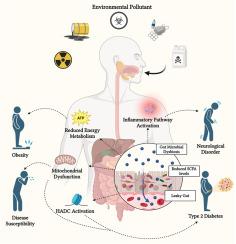环境污染对肠道微生物群和短链脂肪酸(SCFA)介导的代谢失调影响的分子见解
Q2 Medicine
引用次数: 0
摘要
环境污染与各种代谢紊乱以及死亡率上升之间有着不可否认的联系。这一现象在过去几十年中已成为卫生领域的一个重大问题。多项科学研究证明,环境污染物会直接扰乱肠道菌群的平衡。众所周知,肠道微生物的不平衡会导致其代谢副产物的改变。一个值得注意的副产物是短链脂肪酸(SCFA),主要是由肠道细菌发酵不消化的碳水化合物产生的。越来越多的证据表明,短链脂肪酸对整体健康和各种疾病的发展有重大影响。近年来SCFA研究的进展突出了它们在细胞和分子水平上对各种生理系统的重要作用。考虑到SCFAs在G蛋白偶联受体(GPCR)和组蛋白去乙酰化酶(HADC)调控中的作用,其上调或下调明显影响多种疾病的发生发展。本文综述了各种环境污染物对SCFA水平的影响。此外,它还深入探讨了SCFAs在不同疾病发生中的可能影响及其复杂的分子机制。本文章由计算机程序翻译,如有差异,请以英文原文为准。

Molecular insights into the impact of environmental pollution on gut microbiota and short chain fatty acids (SCFA) mediated metabolic dysregulation
There is an undeniable link between environmental pollution and various metabolic disorders, as well as increased mortality rates. This phenomenon has become a significant concern in the health field over the past few decades. Multiple scientific studies have provided evidence that environmental pollutants can directly disturb the equilibrium of gut microbiota. It is well-known that an imbalance in gut microbes leads to alterations in their metabolic byproducts. A notable byproduct is short-chain fatty acids (SCFA), mainly generated through the fermentation of indigestible carbohydrates by gut bacteria. There is a growing body of evidence indicating that SCFAs have a significant impact on overall health and the development of various diseases. Recent advancements in SCFA research have highlighted their considerable effects on various physiological systems operating at the cellular and molecular levels. Considering the role of SCFAs in regulating G protein-coupled receptors (GPCR) and histone deacetylase (HADC), it becomes evident that their upregulation or downregulation can significantly impact the development of various diseases. This review explores the impact of various environmental pollutants on SCFA levels. Furthermore, it delves into the possible implications of SCFAs on developing different diseases and the intricate molecular mechanisms involved.
求助全文
通过发布文献求助,成功后即可免费获取论文全文。
去求助
来源期刊

Medicine in Microecology
Medicine-Gastroenterology
CiteScore
5.60
自引率
0.00%
发文量
16
审稿时长
76 days
 求助内容:
求助内容: 应助结果提醒方式:
应助结果提醒方式:


